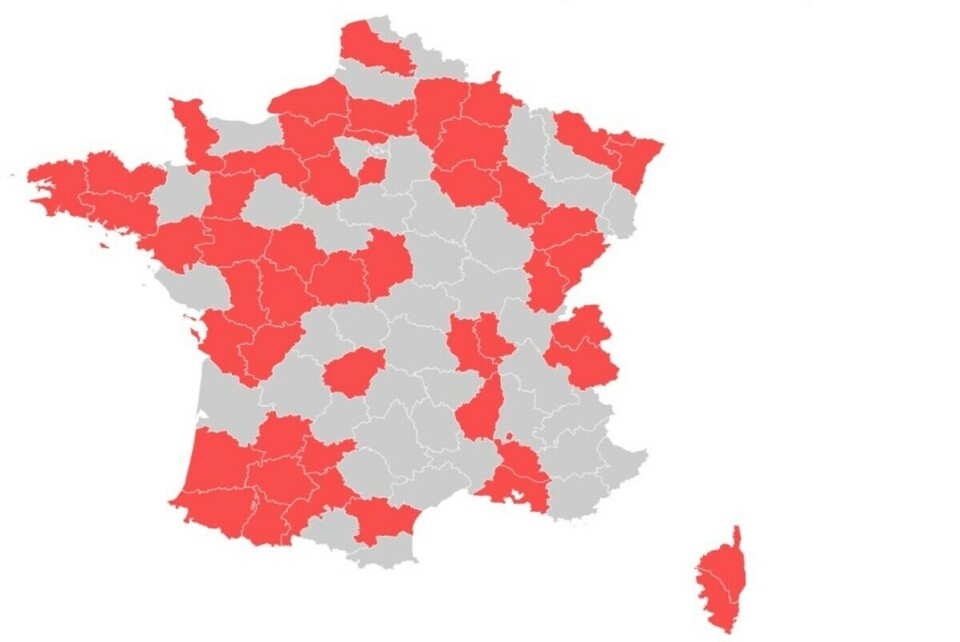-
Why French bank cards are losing their printed security numbers
The new system aims to reduce fraud and simplify online shopping
-
Many French property energy efficiency ratings now out of date: How to check yours
The change will affect you if you plan to sell or rent a property
-
How cold is it going to be in France and for how long? Tips to stay healthy
The freezing weather is showing no signs of abating, with temperatures as low as -9C
Map: Where in France are emergency call staff going on strike?
Rolling strikes begin on Monday (July 3) and nearly 50 call centres are affected

Emergency call staff in France say they are going on strike from Monday (July 3) in protest at understaffing, poor working conditions, and a lack of recognition for their work.
They are known as Assistants de régulation médicale (ARM) in France and are the first to answer the phone when you call the number 15.
The Association française des assistants de régulation médicale (Afarm) has called a rolling strike, meaning an end date has not yet been confirmed.
How many call centres are affected, and where?
So far, almost 50 centres that answer calls to number 15 are affected. However, the list may continue to grow over the week.
Staff are on strike across much of the country, especially in the southwest, northwest, and northeast.
Why are they striking?
Lack of staff
Many workers at centres in so-called ‘medical deserts’ say they are striking in protest at a lack of staff.
Despite a campaign to recruit more ARMs, which launched in September 2022, staff in the profession say that there are not enough people and that the job remains under-appreciated.
Dr Caroline Brémaud, head of emergency services at Laval hospital, criticised the health ministry’s campaign that asks people to call 15 rather than go directly to hospital.
She said, sarcastically: “It's wonderful. Except that at the end of the phone, at night, there are two people answering. So if we tell everyone to call 15, we're likely to have long pick-up times.”
Breakdown in communications with the government
Marc Noizet, president of Samu-Urgences de France, said that negotiations with France’s health ministry had broken down.
He told Capital: "Since May, our [Health Ministry] has broken off all negotiations about improving the attractiveness of the medical and paramedical professions.”
President Emmanuel Macron said he was aiming to “create an injection of attractiveness [to the profession]” with initial measures expected this summer.
But Mr Noizet said that the group had “sent a reminder to the Directorate-General for Healthcare Provision, but there's been no response”.
He warned: “If we don't tend to healthcare professionals, to those who work in public hospitals, they will end up leaving the system to do something else.”
Poor working conditions
In a statement, the Action praticiens hôpital (APH) union, which includes the Samu-Urgences de France, said: "The anger of practitioners is historic. The contempt shown towards those who cared for our fellow citizens during the Covid-19 pandemic and who are still holding out at all costs must stop immediately.”
It added that 30% of hospital doctor jobs are either vacant, filled by temporary staff, or foreign doctors. It said that the number of applicants to the hospital practitioner exams fell further in spring 2023. There were just 3,364 applications received for 10,846 vacancies, compared with 4,056 applications a year earlier.
The union is now calling for "an urgent meeting with the President, who made a commitment".
In a similar statement, the Intersyndicat national des praticiens d’exercice hospitaliers et hospitalo-universitaire (Inph) said: “The situation in public hospitals has never been so bad. The profession of hospital practitioner has become a real disgrace.”
It added: “A large number of colleagues across all disciplines and all ages are leaving more and more. Young doctors no longer want to take part in a profession that has become so unattractive.”
Lack of hospital beds
Professor Louis Soulat, head of emergencies at Rennes University Hospital, said that “entire departments are being closed” due to a lack of beds, and not only in the emergency department.
He told FranceInfo: “We estimate that between 15% and 20% of beds have been closed. In some outlying establishments, up to 40% of medical beds will be closed this summer.”
Are they the only ones striking?
No. Several other professional healthcare unions have announced plans to strike for at least today and tomorrow (July 3 and 4). These include emergency staff, gynaecologists and obstetricians, biologists, and paediatricians.
What will be the effects on the care provided?
So far, it appears that some call centres will see longer waiting times, and some hospital emergency departments will be closed at night time.
Only patients who have previously called 15 and been authorised to go to hospital will be accepted at night in many places.
Related articles
One in five French A&E units face cuts or closure due to lack of staff
Protests to put dozens of French hospitals at risk of partial closure
A decade before France has more doctors, admits health minister























